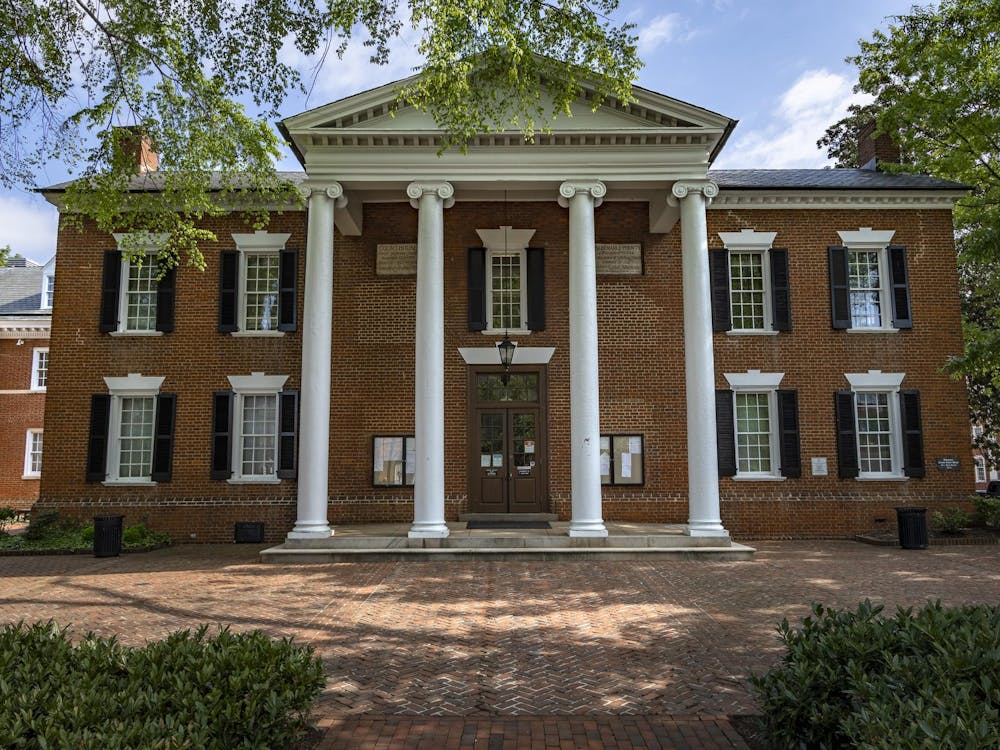The University’s Department of Media Studies hosted Federal Communications Commissioner Jessica Rosenworcel and former Commissioner and Acting Chair Michael Copps Tuesday evening in Minor Hall for a public discussion on topics in media policy, including rural broadband access, corporate consolidation and network neutrality.
The discussion was moderated by Media Studies Assoc. Prof. Christopher Ali, who began the event by providing an overview of the societal issues and questions facing the future of digital life. Rosenworcel and Copps — both Democratic members of the FCC who have been involved in landmark decisions including the Comcast-NBCUniversal merger, network neutrality and the T-Mobile-Sprint merger — said that digital inclusion and concentration of media ownership are among their top concerns in media policy.
“The future belongs to the connected,” Rosenworcel said in her opening remarks. “No matter who you are or where you live, you need access to modern communications to have a fair shot at 21st century success. The thing is that access is not inevitable — it’s the result of policy choices that we make that are vital to our digital futures.”
According to the FCC’s Broadband Progress Report, approximately 19 million Americans — 6 percent of the population — currently lack access to fixed broadband service. Nearly 1/4 of the rural population also lack broadband access, which Copps called a basic civil right for all humans.
“Because they don’t have consistent and reliable [broadband] access, they are not participating in the full range of civic and commercial culture,” Rosenworcel said, adding that the FCC needs to find more creative solutions to media policy issues, such as crowdsourcing information to map where broadband access is lacking.
Rosenworcel, one of five current FCC Commissioners, was first nominated by former President Barack Obama in 2011. She was nominated for an additional term by President Donald Trump in 2017. Copps, who served as an FCC Commissioner from 2001 to late 2011 and acting chair in 2009, is currently a special adviser to the Media and Democracy Reform Initiative at Common Cause, a nonpartisan grassroots organization focused on upholding the values of democracy.
Copps mentioned that the current media landscape is changing, as there has been an unprecedented consolidation of traditional media outlets in recent years as large mergers and corporate deals have reduced the number of voices and viewpoints in the media marketplace.
“I am particularly concerned about the state of our news and information infrastructure,” Copps said. “We can’t successfully practice self government unless you...have real journalism at the local level, state level and national level.”
Rosenworcel added that new economic models are needed to support local journalism so that large corporations do not monopolize control of content and distribution of news, which has caused hundreds of small newspapers to close.
“News is absolutely vital for us to have a functioning democracy, so making sure that we have policies and economic models that support news gathering are really important,” Rosenworcel told The Cavalier Daily. “We see how important it is right now because we’ve seen a lot of newspapers fold and journalists lose their jobs.”
The FCC Commissioners also discussed network neutrality — a term coined by former U.Va. Assoc. Prof. of Law Tim Wu — which would restrict internet service providers from discriminating against content or content providers. Network neutrality regulation was repealed by the FCC in 2018 — a decision that Rosenworcel criticized because broadband providers can now block websites and censor online content.
In their closing remarks, both commissioners urged students to speak up about media issues they care about in order to create change.
“We need to have reform, but we can’t expect it to come out of Washington, D.C. automatically,” Copps said. “It has to come from the grassroots, it has to come from folks like you — your generation.”
Ali, who teaches a course on Media Policy and Law in the College, said he hopes students gained an understanding of the critical issues facing the media industry, as well as an idea of how they can help solve them.
“I don't think there's a one-size-fits-all solution to the crisis of media that we're experiencing, but there are a lot of different options,” Ali told The Cavalier Daily. “I think it's going to be up to [students] to pick which ones resonate most with our lives, and hopefully do a deep dive.”
Around 80 students and faculty attended the event, in addition to a question and answer lunch session for 15 randomly selected students with the Commissioners. University alumnus Umair Javed, a legal advisor to Rosenworcel for wireless and international issues, and Yosef Getachew, media and democracy program director at Common Cause, also spoke at the lunch session about working in legal and public policy fields.
Parker Bach, a fourth-year College student who attended the event, said that students have an important role to play in media policy decisions.
“It’s easy as a Media Studies major to feel like the issues we discuss are purely academic,” Bach said. “But this event reminded me that the digital future is ours to shape through our actions online, our market choices, and the representatives we elect.”
Ali added that he wants students to think about media policy in the same light as healthcare and defense policy, which tends to dominate the national public policy conversation.
“When we talk about the major policy crises in this country, why don't we think about communications and media?” Ali said. “We need telecommunications, we need the Internet, we need cell phones — you can't have a democracy without these things anymore, so I would love it if students left the event thinking that media policy matters.”







